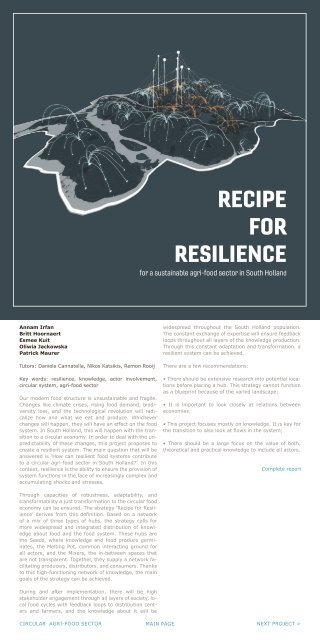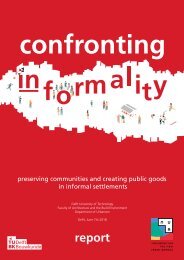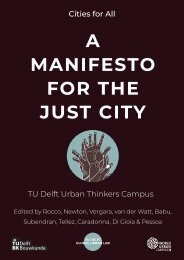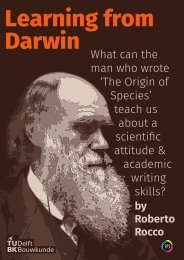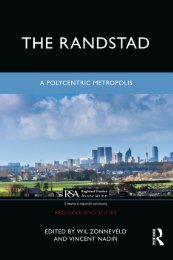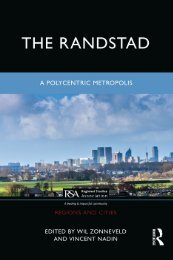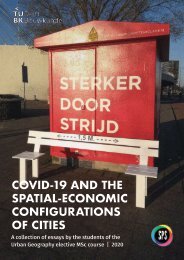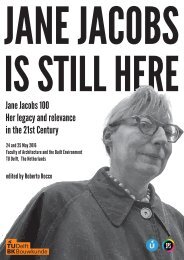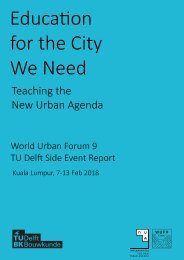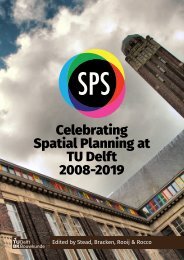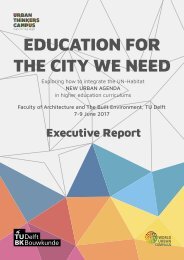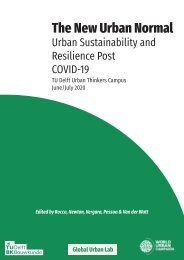Circular Southern Holland, an Online Exhibition
Online exhibition R&D studio Spatial Strategies for the Global Metropolis (AR2U086 & AR2U088), part of MSc Urbanism, Delft University of Technology, organised by Verena Balz and Qu Lei. We proudly present results of the Research & Design studio Spatial Strategies for the Global Metropolis, part of the MSc Architecture, Urbanism and Building Sciences/Track Urbanism programme at Delft University of Technology in an online exhibition. The thematic focus of the 2020-2021 round of the studio was informed by an ambitious policy agenda that the Province of South Holland has set out: aligned with objectives of the Dutch national government, it intends to host a 100% circular economy by 2050. 19 groups of students have analysed spatial and institutional development in Southern Holland and have designed visions and development strategies that lead towards a circular construction- and demolition sector, a circular agri-food sector, and a circular bio-based chemical sector in the region. In conjunction the projects presented in this exhibition explore the spatiality of a circular economy and seek to inspire spatial planning in this way. In the exhibition each student groups’ project is represented by an executive summary, which gives key information on the project and main recommendations on how to foster a circular economy in Southern Holland, and the title page of the group’s project report. Visitors who want to gain a deeper insight into projects can access the actual report in the TU Delft education repository.
Online exhibition R&D studio Spatial Strategies for the Global Metropolis (AR2U086 & AR2U088), part of MSc Urbanism, Delft University of Technology, organised by Verena Balz and Qu Lei.
We proudly present results of the Research & Design studio Spatial Strategies for the Global Metropolis, part of the MSc Architecture, Urbanism and Building Sciences/Track Urbanism programme at Delft University of Technology in an online exhibition.
The thematic focus of the 2020-2021 round of the studio was informed by an ambitious policy agenda that the Province of South Holland has set out: aligned with objectives of the Dutch national government, it intends to host a 100% circular economy by 2050. 19 groups of students have analysed spatial and institutional development in Southern Holland and have designed visions and development strategies that lead towards a circular construction- and demolition sector, a circular agri-food sector, and a circular bio-based chemical sector in the region. In conjunction the projects presented in this exhibition explore the spatiality of a circular economy and seek to inspire spatial planning in this way.
In the exhibition each student groups’ project is represented by an executive summary, which gives key information on the project and main recommendations on how to foster a circular economy in Southern Holland, and the title page of the group’s project report. Visitors who want to gain a deeper insight into projects can access the actual report in the TU Delft education repository.
You also want an ePaper? Increase the reach of your titles
YUMPU automatically turns print PDFs into web optimized ePapers that Google loves.
RECIPE<br />
FOR<br />
RESILIENCE<br />
for a sustainable agri-food sector in South <strong>Holl<strong>an</strong>d</strong><br />
Annam Irf<strong>an</strong><br />
Britt Hoornaert<br />
Esmee Kuit<br />
Oliwia Jackowska<br />
Patrick Maurer<br />
Tutors: D<strong>an</strong>iele C<strong>an</strong>natella, Nikos Katsikis, Remon Rooij<br />
Key words: resilience, knowledge, actor involvement,<br />
circular system, agri-food sector<br />
Our modern food structure is unsustainable <strong>an</strong>d fragile.<br />
Ch<strong>an</strong>ges like climate crises, rising food dem<strong>an</strong>d, biodiversity<br />
loss, <strong>an</strong>d the technological revolution will radicalize<br />
how <strong>an</strong>d what we eat <strong>an</strong>d produce. Whichever<br />
ch<strong>an</strong>ges will happen, they will have <strong>an</strong> effect on the food<br />
system. In South <strong>Holl<strong>an</strong>d</strong>, this will happen with the tr<strong>an</strong>sition<br />
to a circular economy. In order to deal with the unpredictability<br />
of these ch<strong>an</strong>ges, this project proposes to<br />
create a resilient system. The main question that will be<br />
<strong>an</strong>swered is ‘How c<strong>an</strong> resilient food systems contribute<br />
to a circular agri-food sector in South <strong>Holl<strong>an</strong>d</strong>?’. In this<br />
context, resilience is the ability to ensure the provision of<br />
system functions in the face of increasingly complex <strong>an</strong>d<br />
accumulating shocks <strong>an</strong>d stresses.<br />
widespread throughout the South <strong>Holl<strong>an</strong>d</strong> population.<br />
The const<strong>an</strong>t exch<strong>an</strong>ge of expertise will ensure feedback<br />
loops throughout all layers of the knowledge production.<br />
Through this const<strong>an</strong>t adaptation <strong>an</strong>d tr<strong>an</strong>sformation, a<br />
resilient system c<strong>an</strong> be achieved.<br />
There are a few recommendations:<br />
• There should be extensive research into potential locations<br />
before placing a hub. This strategy c<strong>an</strong>not function<br />
as a blueprint because of the varied l<strong>an</strong>dscape;<br />
• It is import<strong>an</strong>t to look closely at relations between<br />
economies;<br />
• This project focuses mostly on knowledge. It is key for<br />
the tr<strong>an</strong>sition to also look at flows in the system;<br />
• There should be a large focus on the value of both,<br />
theoretical <strong>an</strong>d practical knowledge to include all actors.<br />
Complete report<br />
Through capacities of robustness, adaptability, <strong>an</strong>d<br />
tr<strong>an</strong>sformability a just tr<strong>an</strong>sformation to the circular food<br />
economy c<strong>an</strong> be ensured. The strategy ‘Recipe for Resilience’<br />
derives from this definition. Based on a network<br />
of a mix of three types of hubs, the strategy calls for<br />
more widespread <strong>an</strong>d integrated distribution of knowledge<br />
about food <strong>an</strong>d the food system. These hubs are<br />
the Seeds, where knowledge <strong>an</strong>d food produce germinates,<br />
the Melting Pot, common interacting ground for<br />
all actors, <strong>an</strong>d the Mixers, the in-between spaces that<br />
are not tr<strong>an</strong>sparent. Together, they supply a network facilitating<br />
producers, distributors, <strong>an</strong>d consumers. Th<strong>an</strong>ks<br />
to this high-functioning network of knowledge, the main<br />
goals of the strategy c<strong>an</strong> be achieved.<br />
During <strong>an</strong>d after implementation, there will be high<br />
stakeholder engagement through all layers of society, local<br />
food cycles with feedback loops to distribution centers<br />
<strong>an</strong>d farmers, <strong>an</strong>d the knowledge about it will be<br />
CIRCULAR AGRI-FOOD SECTOR<br />
MAIN PAGE


